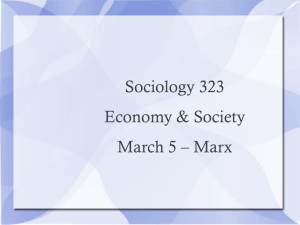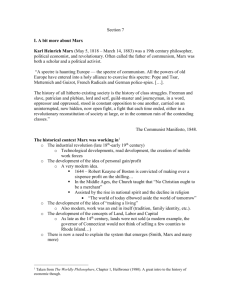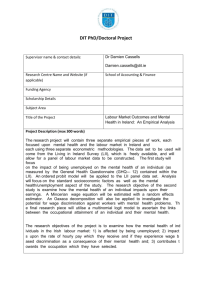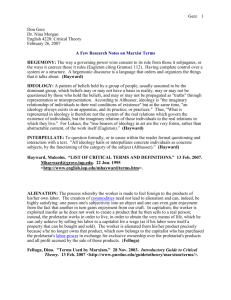Karl Marx
advertisement
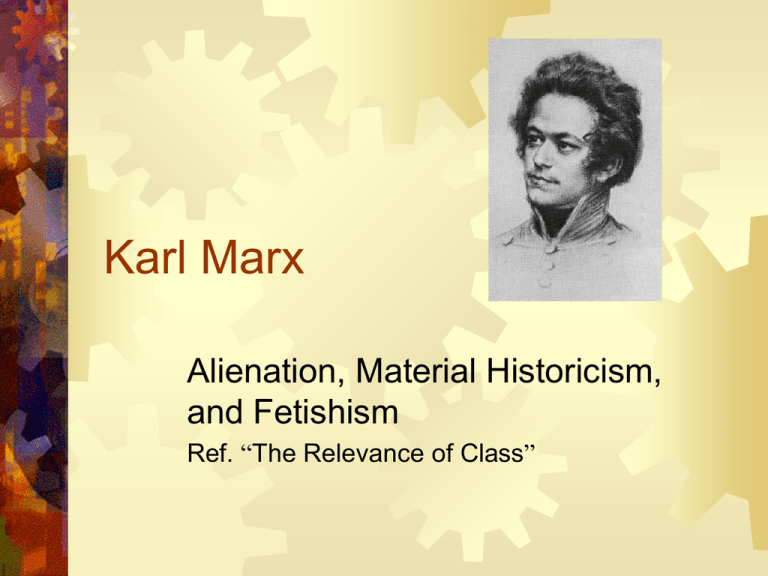
Karl Marx
Alienation, Material Historicism,
and Fetishism
Ref. “The Relevance of Class”
Outline
Starting
Questions
Life and Basic Concepts
Concept 1: Ideology and Materialist
Concept of History;
Concept 2: Alienation
Concept 3: Value and Commodity
Starting Questions
Is our love as conditioned by our unconscious desires,
as by our materialist existence? If the former can be
sublimated, can the latter be transcended?
Materialist determinism: To what extent is
consciousness determined by “existence,” or the
socio-economic aspects of our life? (Norton 768,
concept 2)
Alienation: What does “wage labor” mean? Who
are wage laborers? Does alienation happen to any
kind of wage laborers? (Norton 764-67—concept 1)
Fetishism: How does Marx explain fetishism? How is
it different from the way Freud defines it?
(Note: Freud: To disavow the mother’s lack of phallus, a man
shifts his object of love to an inanimate object associated with
the mother or to a specific part of her body.)
Karl Marx: his Life
生於德國(Trier, Germany, on May, 1818) 猶
太中產階級. 23歲獲得博士學位。
1845-1847 年間加入共產黨.和恩格斯都加入
第一國際(The International Working Men‘s
Association; 1864年建立),之後馬克斯成為
其領袖.
1849 moved to London and stayed there for
the rest of his life.
革命者(恩格斯在他的墓前說他是「before all
else a revolutionist」). (Schimitt xiii; 3)
Karl Marx: his Work and Major Concepts
up to 1844 -- Early Writings
1.
2.
1844 Manuscripts (The Economic and
Philosophical Manuscripts) Alienated
Labor
revising Hegel’s concept of alienation;
4 types:
1)
2)
3)
4)
from his product;
from himself in the act of production;
from his ‘humanity’ or social essence
(which is taken away from him);
from other individuals
Ref. McLellan
Karl Marx: his Work and Major Concepts
1844-1847
German Ideology (With Engels 1845-46;
published 1932)
Historical Materialism --
“Life is not determined by consciousness,
but consciousness by life.” (768)
four forms of ownership:
tribal,
ancient communal/State,
feudal/estate property,
Capitalist, private property exploitation
communism
Karl Marx: his Work and Major Concepts
1848 –
Communist Manifesto;
1) history of class society and the future of
communism;
2) communists positions with proletarian and
communist revolution
3) criticism of the other types of socialism
4) description of communist tactics and finishes
with an appeal to the proletariat unity.
Our excerpt – bourgeois vs. proletariat (pp.
770-71) –how the bourgeoisie is revolutionary
(destructive of traditional structures) expanding
its power.
Wage Labor and Capital;
Impoverishment or immiseration thesis
Karl Marx: his Work and Major Concepts
1857-67 –Economics
Grundrisse(or Foundations of the Critique of
Political Economy) interrelationship of
production, consumption, distribution & exchange.
《資本論》Capital concepts of value, labor and
surplus value.
Concept 1: Alienation
1.
2.
From "Wage Labour and Capital“
surplus value: the differences between wage
labor and sale price.
Labor power is . . . a commodity which its
possessor, the wage worker, sells to capital.
(Both the labor power and laberer become commodities.)
3.
Capital does not consist in accumulated labor
(or surplus value) serving living labor as a
means for new production. It consists in living
labor(or laborers) serving accumulated
labor as a means of maintaining and
multiplying the exchange value of the latter.
Ref. Alienation: Hegel’s concept
The Phenomenology of Spirit –the development of
mind (or spirit) from its immediate perception of the
here and now to the stage of self-consciousness
(understanding of the world, and ordering the self’s
action accordingly ), the stage of reason
(understanding of the real), after which the spirit, by
means of religion and art, attained to the absolute
knowledge (recognizing in the world the stages of
their own reason).
These stages Hegel called ‘alienation’ creations
of the mind which are superior to the mind.
Concept 1: Wage labor
A wage labourer is a person whose
primary means of income is to sell labor.
From The Communist Manifesto (anthology
771)
“The bourgeoisie . . . has played a most
revolutionary part. . . . has stripped of its halo
every occupation hitherto honored and looked up to
with reverent awe. It has converted the physician,
the lawyer, the priest, the poet, the man of science,
into its paid wage-laborers.” (771)
Concept 1: Wage Labor +
industrialism Alienation
1844 Manuscript: Alienated labor (anthology765-67 )
Capitalist – two classes: the property-owners and
propertyless workers.(764)
Labour produces not only commodities; it produces
itself and the worker as commodity.
The more he produces, the less he possesses.
His labor becomes “an object, an external
existence, … outside him…as something alien to
him.”
Four kinds of alienation of labour (767)
Wage Labor and Alienation
"The worker becomes all the poorer the more wealth he
produces, the more his production increases in power
and extent. The worker becomes an ever cheaper
commodity the more commodities he produces. ...Labour
produces not only commodities; it produces itself and the
worker as a commodity….
…the object which labour produces—labour’s product—
confronts it as something alien, as a power independent
of the producer. The product of labour is labour which
has been congealed in an object, which has become
material: it is an objectification of labour. ...
All these consequences are contained in this
characteristic, that the worker is related to the product of
labour as to an alien object."
Concept 2: Materialist concept
of history –1) ideology
Inversion of German idealism.
Life is not determined by consciousness, but
consciousness by life.” (anthology 768)
“. . . Man makes religion, religion does not make
man.”
Not all ideas are ideologies, which support
those in power. Those connected with the
contradictions in socio-economic relations or
the labor process.
Contradictions caused by 1) division and alienation
of labor; 2) possession of private property
Materialist Determinism
The production of ideas, of conceptions, of
consciousness, is at first directly interwoven with the
material activity and the material intercourse of men, the
language of real life. Conceiving, thinking, the mental
intercourse of men, appear at this stage as the direct
efflux of their material behaviour. … Men are the
producers of their conceptions, ideas, etc. – real, active
men, as they are conditioned by a definite development
of their productive forces and of the intercourse
corresponding to these, up to its furthest forms.
Consciousness can never be anything else than
conscious existence, and the existence of men is their
actual life-process. If in all ideology men and their
circumstances appear upside-down as in a camera
obscura, this phenomenon arises just as much from their
historical life-process as the inversion of objects on the
retina does from their physical life-process. (768)
1) ideology--definitions
German Ideology: “Ruling ideas of the ruling class.”
False consciousness (Engel’s term) the
camera obscura allusion.(768)
“The ideas of the ruling class are in every epoch the
ruling ideas, . . . The class which has the means of
material production at its disposal, has control at the
same time over the means of mental production, so
that thereby, generally speaking, the ideas of those
who lack the means of mental production are
subject to it. The ruling ideas are nothing more than
the ideal expression of the dominant material
relationships, the dominant material relationships
grasped as ideas; hence of the relationships which
make the one class the ruling one, therefore, the
ideas of its dominance.
精忠報國;毋忘在莒;處變不驚、莊敬自強
1) ideology--definitions
Later
writings: ideology as illusion vs.
ideology as functional in daily life.
German ideology published in 1923.
International simplification of Marx’s
idea of economic determinism;
Ideology – seen as negative;
Western Marxists e.g. Gramsci & Althusser
(McLellan 1995: 19; Ref. Anthology 762)
2nd
Concept 2: Materialist concept
of history and society
The socio-economic process (e.g. base) is
basic to human society and the other human
activities (such as religion, politics and other
cultural activities and forms of social
consciousness, which form Superstructure) are
secondary.
modes of production: 'The windmill gives you
society with the feudal lord: the steam-mill,
society with the industrial capitalist' ('The
Poverty of Philosophy', 1847). Marx does not
always support this narrow causal connection.
Concept 2: Materialist concept
of history 2)
Dialectical
Materialism
Four forms of ownership in history:
Primitive
slave
feudal
Communism,
no classes Bondage; Nobility;
landed
state
ownership
(future:
Capitalist,
bourgeois
communist)
Class struggle Communist Manifesto
Ref. Dialectical Materialism in History
“. . . at each stage there is found a material
result: a sum of productive forces, an
historically created relation of individuals to
nature and to one another, which is handed
down to each generation from its
predecessor; a mass of productive forces,
capital funds and conditions, which, on the
one hand, is indeed modified by the new
generation, but also on the other prescribes
for it its conditions of life and gives it a
definite development, a special character. It
shows that circumstances make men just as
much as men make circumstances. (The
German Ideology Chap 2: Civil Society and the Conception of
History )
Concept 3: Value and
Commodity
The materiality of value is not physical but
social. For Marx, value is a social substance
that appears in a series of material forms
(labor-selling people, commodified things,
money).
Use value (quality) vs. Exchange value
(quantity)
Exchange value can be measured (e.g. labortime labor value of the wage (kept as a
secret) vs. labor value of the product
Fetishism
anthology 776 - : commodity as fetishes
Three-stage “fetishization” in commodity
production:
1.
2.
3.
Value creation by labor; (Capital vol 1)
“realization” of this value in monetal form;
“accumulation” of this value through capital
investment that set in motion further cycles of
valorization, realization, and accumulation
(Capital vol 3)
Capital – a universal form; the ultimate
fetish; a means that becomes an end. (e.g.
credit card and stock)
Fetishism (2)
Value creation by labor; (Capital vol 1)
1) p. 776 A thing has a value in use becomes
something transcendent.
The mysterious thing added to commodity through:
Abstraction (1) – producer’s labor for others
(takes a social form) quantified as labor time
(2) The social characters of men’s labour
objective and stamped on their products.
(3) The products take on social relations with
other products.
Fetishism (2) –quote
“A commodity is therefore a mysterious
thing, simply because in it the social character
of men’s labour appears to them as an
objective character stamped upon the product
of that labour; because the relation of the
producers to the sum total of their own labour is
presented to them as a social relation, existing
not between themselves, but between the
products of their labour. This is the reason why
the products of labour become commodities,
social things whose qualities are at the same
time perceptible and imperceptible by the
senses.”(776-77)
The Social Character of Labor
P.
777 labor also abstracted
The relations between the producers
become the relations between their
products = a relation between things
778 – to equate products with values
also means to equate/quantify the
different kinds of labor expended on
them.
Abstraction (3): money
Value
is determined by labour time, but
this is actually a secret hidden. (779)
“It is…just this ultimate money-form of
the world of commodities that actually
conceals, instead of disclosing, the
social character of private labour, and
the social relations between individual
producers.”
Commodity and its Exchange
Value
"Could
commodities themselves speak,
they would say: Our use-value may be a
thing that interests men. It is no part of
us as objects. What, however, does
belong to us as objects, is our value.
Our natural intercourse as commodities
proves it. In the eyes of each other we
are nothing but exchange-values"
The working day
The
life of a laborer vs. the expansion of
capital, which depends on unnatural
extension of the labor day p 784
The Relevance of Class Today
(in terms of control relations) –
and occupation (self-esteem)
Class
Capitalist,
shareholder
operational management
strategic management
wage laborer and working on routine
maintenance
Where are you positioned, and how about
teachers??
Corporation
1.
2.
3.
three different themes.
The Pathology of Commerce, filmmakers examine
the pathological self-interest of the modern
corporation.
Planet Inc. looks at the scope of commerce and
the sophisticated, even covert, techniques
marketers use to get their brands into our homes.
The final program, Reckoning, examines how
corporations cut deals with any style of
government — from Nazi Germany to despotic
states today — that allow or even encourage
sweatshops, as long as sales go up.
References
McLellan, David, ed. Karl Marx: Selected
Writings. 2nd Ed. Oxford: Oxford UP, 1977,
2000.
Tucker, Robert C ed. The Marx and Engels
Reader. 2nd Ed. NY: Norton, 1978.
Schmitt, Richard. Introduction to Marx and
Engels: A Critical Reconstruction. London:
Westview P, 1987.

